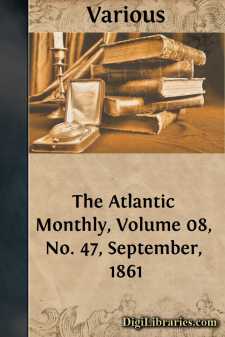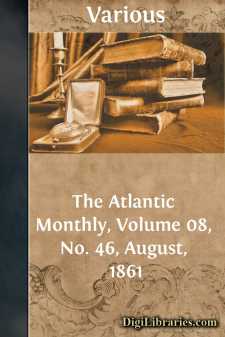Periodicals
- Art 27
- Children's periodicals 59
- Entertainment 5
- Food/Wine 2
- Games/Humor 455
- General 661
- Health 1
- History 53
- House/Home 1
- Regional 62
- Science/Nature 118
- Transportation 10
Periodicals Books
Sort by:
by:
Various
APRIL DAYS. "Can trouble dwell with April days?" In Memoriam. In our methodical New England life, we still recognize some magic in summer. Most persons reluctantly resign themselves to being decently happy in June, at least. They accept June. They compliment its weather. They complained of the earlier months as cold, and so spent them in the city; and they will complain of the later months as...
more...
by:
Various
THE SHAKESPEARE MYSTERY. In 1853 there went up a jubilant cry from many voices upon the publication of Mr. Collier's "Notes and Emendations to the Text of Shakespeare's Plays from Early Manuscript Corrections," etc. "Now," it was said, "doubt and controversy are at an end. The text is settled by the weight of authority, and in accordance with common sense. We shall enjoy...
more...
by:
Various
TREES IN ASSEMBLAGES. The subject of Trees cannot be exhausted by treating them as individuals or species, even with a full enumeration of their details. Some trees possess but little interest, except as they are grouped in assemblages of greater or less extent. A solitary Fir or Spruce, for example, when standing in an inclosure or by the roadside, is a stiff and disagreeable object; but a deep forest...
more...
by:
Various
NEAR OXFORD. On a fine morning in September, we set out on an excursion to Blenheim,—the sculptor and myself being seated on the box of our four-horse carriage, two more of the party in the dicky, and the others less agreeably accommodated inside. We had no coachman, but two postilions in short scarlet jackets and leather breeches with top-boots, each astride of a horse; so that, all the way along,...
more...
by:
Various
THE HOME OF LAFAYETTE. After General Lafayette's visit to the United States, in 1824, every American who went to France went with a firm conviction that he had a right to take as much as he chose of the old gentleman's time and hospitality, at his own estimate of their value. Fortunately, the number of travellers was not great in those days, although a week seldom passed without bringing two...
more...
by:
Various
GEORGE SAND. "Deduci superbo Non humilis mulier triumpho." These words are applied by Horace to the great Cleopatra, whose heroic end he celebrates, even while exulting in her overthrow. We apply them to another woman of royal soul, who, capitulating with the world of her contemporaries, does not allow them the ignoble triumph of plundering the secrets of her life. They have long...
more...
by:
Various
CHAPTER XX FLORENCE AND HER PROPHET It was drawing towards evening, as two travellers, approaching Florence from the south, checked their course on the summit of one of the circle of hills which command a view of the city, and seemed to look down upon it with admiration. One of these was our old friend Father Antonio, and the other the Cavalier. The former was mounted on an ambling mule, whose easy...
more...
by:
Various
I. It is my intention, in this series of papers, to give the history of the progress in Natural History from the beginning,—to show how men first approached Nature,—how the facts of Natural History have been accumulated, and how those facts have been converted into science. In so doing, I shall present the methods employed in Natural History on a wider scale and with broader generalizations than if...
more...
by:
Various
WALKING. I wish to speak a word for Nature, for absolute freedom and wildness, as contrasted with a freedom and culture merely civil,—to regard man as an inhabitant, or a part and parcel of Nature, rather than a member of society. I wish to make an extreme statement, if so I may make an emphatic one, for there are enough champions of civilization: the minister, and the school-committee, and every one...
more...
by:
Various
THE FRUITS OF FREE LABOR IN THE SMALLER ISLANDS OF THE BRITISH WEST INDIES. The emancipation of an enslaved race seems, at first thought, a most uncertain and perilous undertaking. To do away with inherited and constantly strengthening tendencies toward irresponsibility and idleness,—to substitute the pleasure of activity or the distant good from industry for the very palpable influence of...
more...











